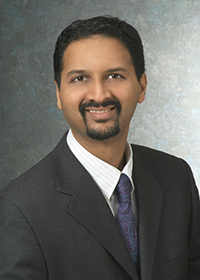 Anant Madabhushi | Dr. Anant Madabhushi is the Director of the Center for Computational Imaging and Personalized Diagnostics
(CCIPD) and an Associate Professor in the Department of Biomedical Engineering and an Adjunct Associate
Professor in the Departments of Pathology, Radiology, Urology, General Medical Sciences, and Electrical
Engineering and Computer Science at Case Western Reserve University. Dr. Madabhushi received his Bachelors
Degree in Biomedical Engineering from Mumbai University, India in 1998 and his Masters in Biomedical
Engineering from the University of Texas, Austin in 2000. In 2004 he obtained his PhD in Bioengineering
from the University of Pennsylvania. He joined the Department of Biomedical Engineering, Rutgers University
as an Assistant Professor in 2005. He was promoted to Associate Professor with Tenure in 2010. In 2012 he
accepted the position of Associate Professor at Case Western Reserve University, Department of Biomedical
Engineering and will be starting and directing a center on computational imaging and personalized
diagnostics. |
 Franco Lepore | Franco Lepore is full professor in the Department of Psychology at the Université de Montréal. He also directs the Centre de Recherche en Neuropsychologie et Cognition (CERNEC) at the Université de Montréal. He received the diploma degree in Doctorate Psychology from the University of Montreal, 1971. In 1972 received the Post-doctorate degree in the University of Pisa, Italy. |
 Paul Yushkevich | I received my Ph.D. in Computer Science in 2003 from the University of North Carolina at Chapel Hill. In 2006, I joined the faculty at the Department of Radiology at the University of Pennsylvania, where I am currently Associate Professor. My research interests include statistical shape analysis, computational object representation, automatic image segmentation, groupwise image registration, and structure-specific analysis of anatomic, functional and diffusion-weighted MRI data; as well as application of these techniques to cross-sectional and longitudinal studies of brain and cardiac disorders. An area of particular interest for me has been the human medial temporal lobe, the seat of memory in the human brain and the site of earliest Alzheimer's disease pathology. My colleagues and I have developed unique techniques targeting this region that combine information from in vivo and high-resolution ex vivo imaging. In addition to theoretical and applied image analysis research, I am active in the development of open-source software and lead the development of ITK-SNAP, a mature multi-platform open-source volumetric image segmentation tool that is used widely in the biomedical imaging community. |
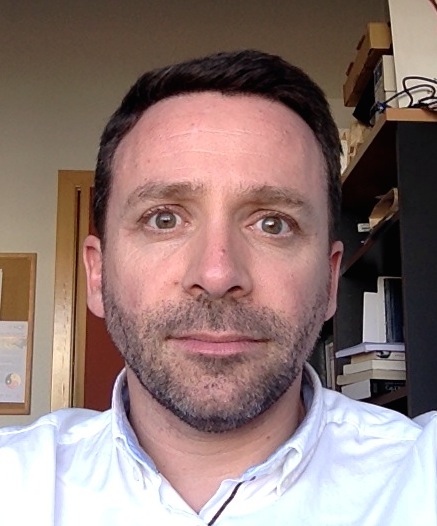 Norberto Malpica | Norberto Malpica received his MsEng. in Telecommunications of and a PhD. in Medical Imaging from Universidad Politécnica de Madrid. He is currently associate professor at Universidad Rey Juan Carlos, where he is the technical director of the Medical Image Analysis and Biometry Lab of Comunidad de Madrid. He is interested in developing technologies for quantitative medical imaging and image-based clinical trials, and in translational innovation in biomedical engineering. He is the associate director of the M+Visión Consortium between Comunidad de Madrid and Massachusetts Institute of Technology. |
 Fernando Mora | Fernando Mora, is currently On-line Visiting Professor in Health Information
Management, Technology, and Leadership and Organizations at St. George's University
(SGU), Grenada, West Indies. From 2009-2012 he participated in the implementation of
the SGU On-line MBA programs in Multi-Sector Health Management and International
Business as well as the PhD in Management. He was formerly Professor of Biomedical
Engineering at Universidad Simón Bolívar in Caracas (Venezuela) where he was the co-
founder of the GBBA (Grupo de BIoingeniería Aplicada) in 1984, one of the first BME
groups in Latin America. He received his Electronic Engineering degree at Universidad
Simón Bolívar in 1975, the M.S. in Biomedical Engineering from California State
University-Sacramento in 1979, and the Doctorat en Sciences, Genie Biologique et
Medical from the Université Francois Rabelais in Tours, France in 1991. Fernando is a
pioneer in the BME field in Latin America, where he was co-founder of CORAL
(Consejo Regional para America Latina) in 1990. He has published extensively in the
Biomedical Engineering field with over 100 papers in journals, conferences, book
chapters and special numbers. He was also Associate Editor of IEEE Transactions in
Biomedical Engineering for several years and served in the board of several international
conferences. At the national level he was the President of the Engineering Committee of
the FONACIT (Venezuelan Ministry of Science and Technology). Since 1985 until 2001
he was responsible for the development of the International Cooperation in Biomedical
Engineering between Venezuela and France and also with the European Union. Currently
his main interests are on mHealth developments, social entrepreneurship and leadership,
collaborative organizations, and crowdsourcing methods in health and in social
movements. |
 Paul Thompson |
Paul Thompson is a professor of neurology at the Imaging Genetics Center (IGC) at the University of Southern California. Thompson obtained a bachelor's degree in Greek and Latin languages and mathematics from Oxford University. He also earned a master's degree in mathematics from Oxford and a PhD degree in neuroscience from University of California, Los Angeles.
Thompson specializes in the field of human brain imaging, with research interest in mathematical and computational algorithm development for human brain mapping, and has contributed to more than 900 publications. He currently leads the Enhancing Neuro Imaging Genetics Through Meta-Analysis (ENIGMA) project, a global data collection and sharing effort designed to understand how brain structure changes during the trajectory of brain atrophy, mental illness and Alzheimer's and the underlying genetic landscape.
|
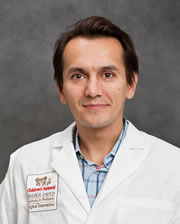 Marius George Linguraru |
Dr. Linguraru loves working with multidisciplinary teams of clinicians, scientists and engineers
to help children grow healthy and happy. He is Principal Investigator in the Sheikh Zayed
Institute for Pediatric Surgical Innovation at Children's National Health System, and Associate
Professor of Radiology and Pediatrics at the School of Medicine and Health Sciences of George
Washington University in Washington, DC. At the Sheikh Zayed Institute, Dr. Linguraru
founded and directs the Quantitative Imaging Group that is creating the next paradigms in
healthcare through image analysis and software-based technology that is objective, robust and
widely accessible.
Dr. Linguraru is internationally known for his work in quantitative imaging to create modern and
mobile health tools that can assess disease, design and evaluate personalized therapies, and
anticipate risk factors in the lives of children. In 2011, he joined the Sheikh Zayed Institute from
the National Institutes of Health Clinical Center, where he maintains an appointment as
Associate Investigator. Dr. Linguraru is the Chair Elect of the Technical Committee for
Biomedical Imaging and Image Processing of the IEEE Engineering in Medicine and Biology
Society and the recipient of numerous awards, including a prize for Excellence in Engineering by
a Younger Engineer at the Houses of Parliament in London, UK. He completed his doctorate at
the University of Oxford and holds masters degrees in science and in arts from the University of
Sibiu, Romania. He held fellowships at the French National Institute of Research in Informatics
and Mathematics and at Harvard University.
|
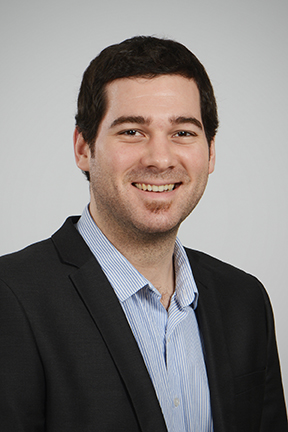 Mathieu Dehaes |
Mathieu Dehaes is an assistant professor of radiology at University of Montréal, Canada and research scientist at the Brain and Child Development Research Axis of the Sainte-Justine Hospital University Center for children in Montréal. After obtaining a bachelor degree in Mathematics and Computer Sciences and a master degree in Applied Mathematics, he earned a Ph.D. degree in Biomedical Engineering from Polytechnic School of Montréal, Canada. His research interests include brain and eye imaging, mathematics and statistical methods and imaging technology development. He is currently developing optical imaging and magnetic resonance imaging methods to assess and monitor cerebral hemodynamics and metabolism in neonates at-risk for brain injury and abnormal development.
|
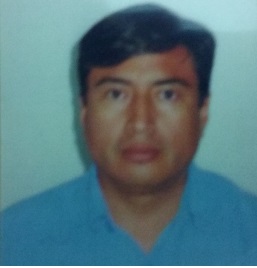 Carlos Julio Tierra Criollo | Carlos Julio Tierra Criollo is associate professor in the Biomedical Engineering Program - Alberto Luiz Coimbra Institute Graduate School and Research in Engineering (COPPE) at Federal University of the Rio de Janeiro (UFRJ) - Brazil. He coordinates the Biomedical Signal and Image Processing Laboratory. He received the diploma degree in Doctorate Biomedical Engineering (2001) from the UFRJ. His areas of interest has been biomedical instrumentation, biological signal processing and neural engineering. |